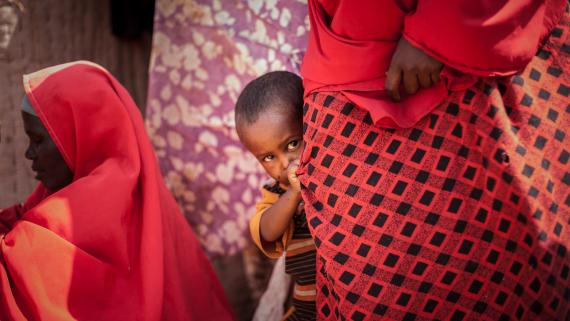Niamey, Niger
In Niger, 1.6 million children are affected by humanitarian crises. Border closures and other COVID-19 containment measures have rendered specific vulnerable groups even more at risk, such as children living on the street. As the pandemic continues to spread across the Sahel region, violence against children has spiked. UNICEF/Juan Haro
Sexual exploitation and abuse are an unacceptable breach of the fundamental rights of the people served by the humanitarian sector and of those working within it, as well as a deep betrayal of its core values.
The IASC supports a humanitarian environment in which people affected by crises are safe and respected, and can access the protection and assistance they need without fear of exploitation or abuse by any aid worker. The IASC also supports aid workers themselves, ensuring they are respected and empowered to deliver aid and protection in a manner that is free from abuse.
The IASC is scaling up protection from sexual exploitation and abuse (PSEA) within all humanitarian response operations, focusing on three priorities at country level:
- Encouraging victims to come forward by ensuring that safe, trusted and accessible mechanisms for reporting SEA are available in all humanitarian situations, and promoting a “speak up” culture within IASC entities.
- Improving quality, survivor-centred SEA assistance and additional protection measures.
- Strengthening vetting, reference-checking, investigation processes and disciplinary measures, including prompt and respectful investigations.
Ethiopia: strengthening complaints and feedback mechanisms

The PSEA Network in Ethiopia, together with the Inter-Agency Accountability Working Group, is undertaking a collective mapping of existing complaints and feedback mechanisms (CFMs) and services - including GBV and child protection services. The mapping focuses on the three regions hosting IDPs and potentially the region hosting refugees. It will entail an analysis of the coverage and functionality of individual organisations’ CFMs to enable the set-up of complementary, inter-agency reporting channels tailored to a specific community. The mapping will also enable the drafting of the inter-agency PSEA community-based complaint mechanisms standard operating procedures, including referral pathways and defining the recording and processing of complaints in country. The Logistics Cluster (LC) is providing information management expertise to the mapping exercise by adapting its interactive Road Access Constraints Map. This interactive map will enable access to information about operational CFMs and assistance services locally. It will be accessible to both aid workers and communities. A dashboard will be extracted, translated into local languages, printed and made available locally. This initiative reflects a collective people-centered approach: it considers communities’ needs for information and access to operational CFMs, rather than an organizations’ own mechanisms.
UNHCR/Mustafa SaeedIn 2020, the IASC issued the Interim Technical Note: Protection from Sexual Exploitation and Abuse (PSEA) during COVID-19 Response. To date, as part of the COVID-19 response, 22.6 million children and adults were provided with a safe channel to report SEA. In addition, UNHCR and ICVA launched an Interagency Community Outreach and Communications Fund on PSEA, and the IASC produced an interactive learning package for IASC partner staff to raise awareness of sexual misconduct. It also strengthened the Six Core Principles on PSEA.
An IASC PSEA site and global dashboard have been launched to make resources more readily available to practitioners and to track progress on PSEA against IASC commitments.
Zimbabwe: integrating PSEA into planning

PSEA has been established as a core priority of Zimbabwe’s 2021 Humanitarian Response Plan. Under the leadership of the Resident Coordinator and with the technical support of a dedicated PSEA Coordinator, the Humanitarian Country Team has ensured that PSEA is incorporated throughout all stages of the planning process. This includes in the inter-cluster review process, plus a review of critical projects by the PSEA Coordinator. Recognizing that PSEA needs to be implemented rapidly and effectively, the 2021 HRP includes a dedicated inter-agency PSEA project to ensure that resources are available for collective PSEA initiatives. This builds on the activation and training of Zimbabwe’s PSEA Steering Committee and PSEA Network, as well as the roll-out of sexual exploitation and abuse reporting standard operating procedures.
UNFPA/Nikita LittleFurther reading
Source: IASC
Source: IASC





